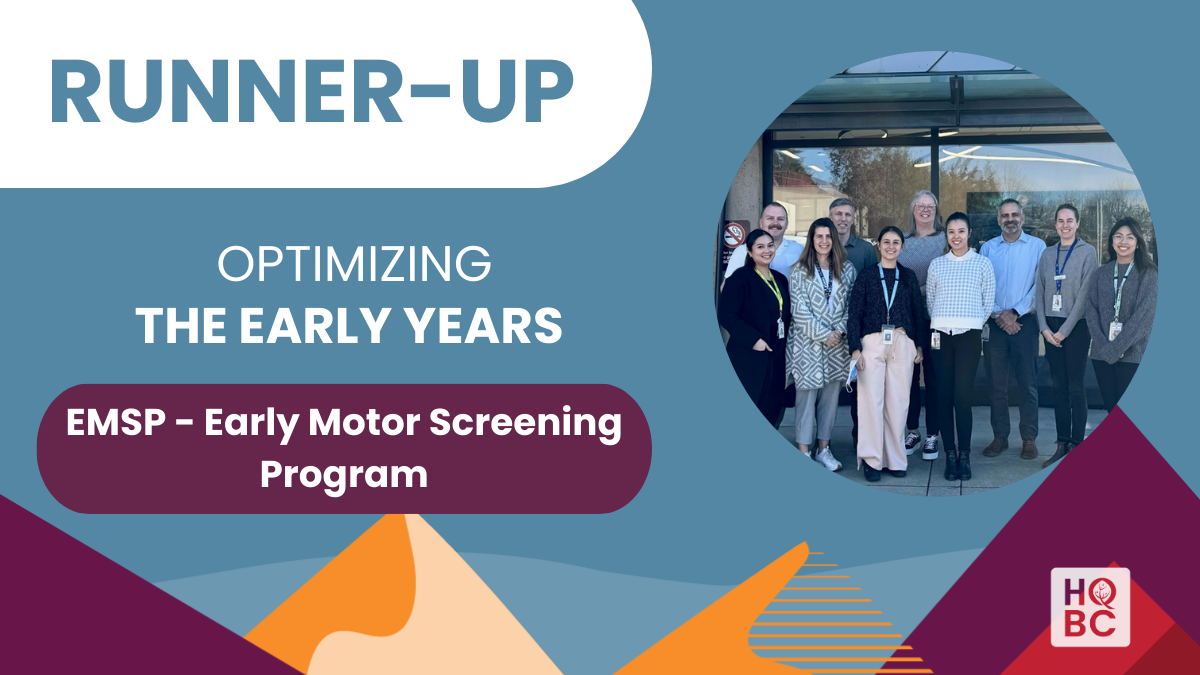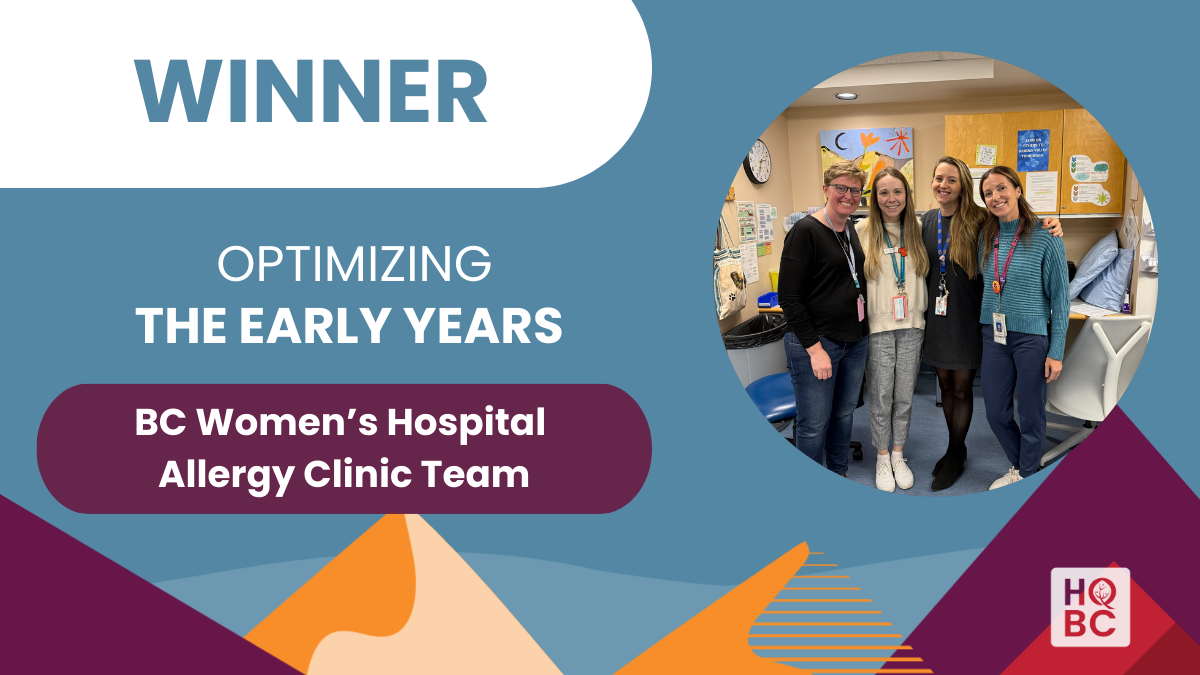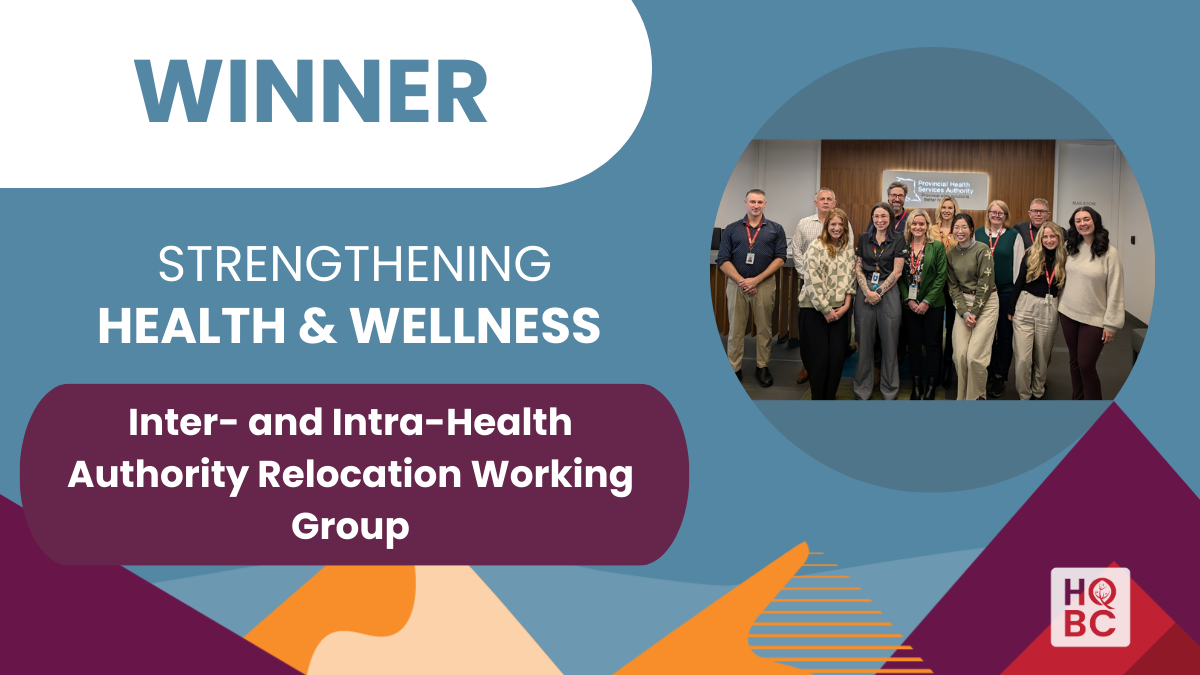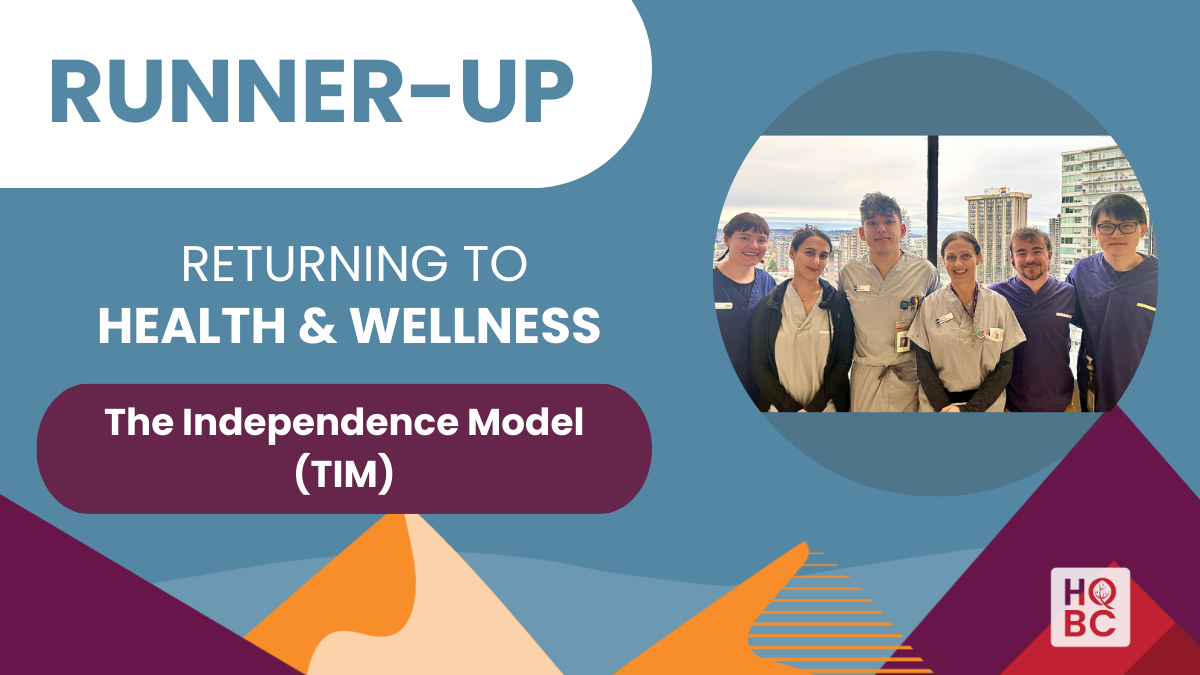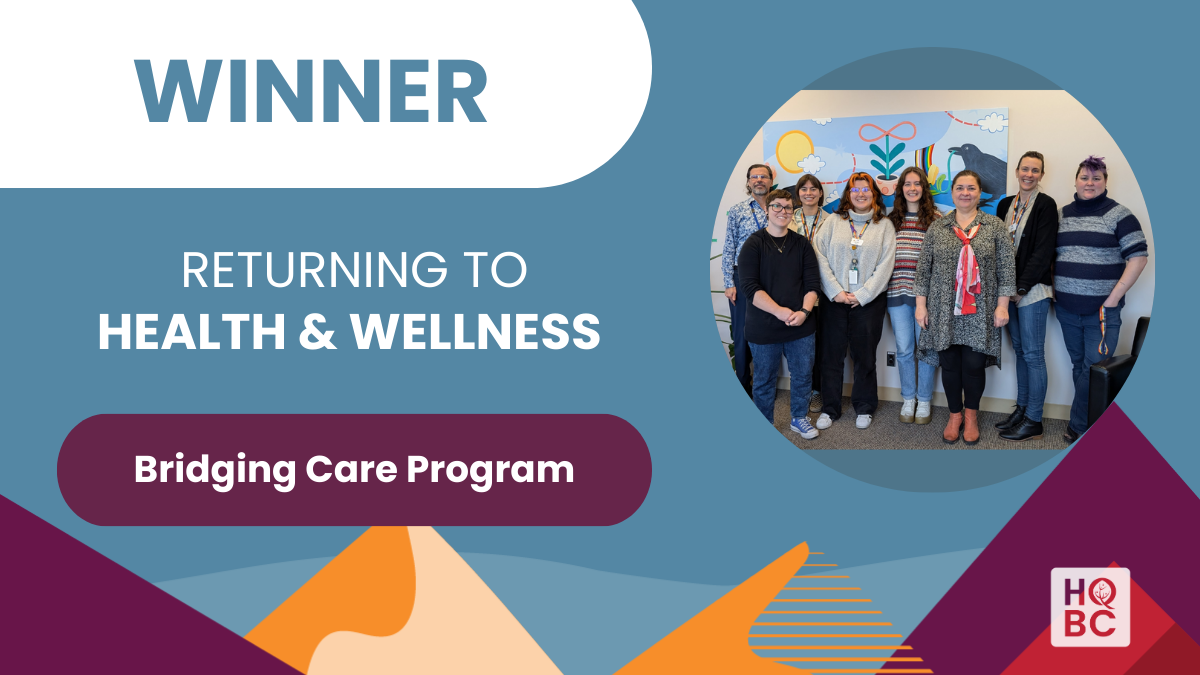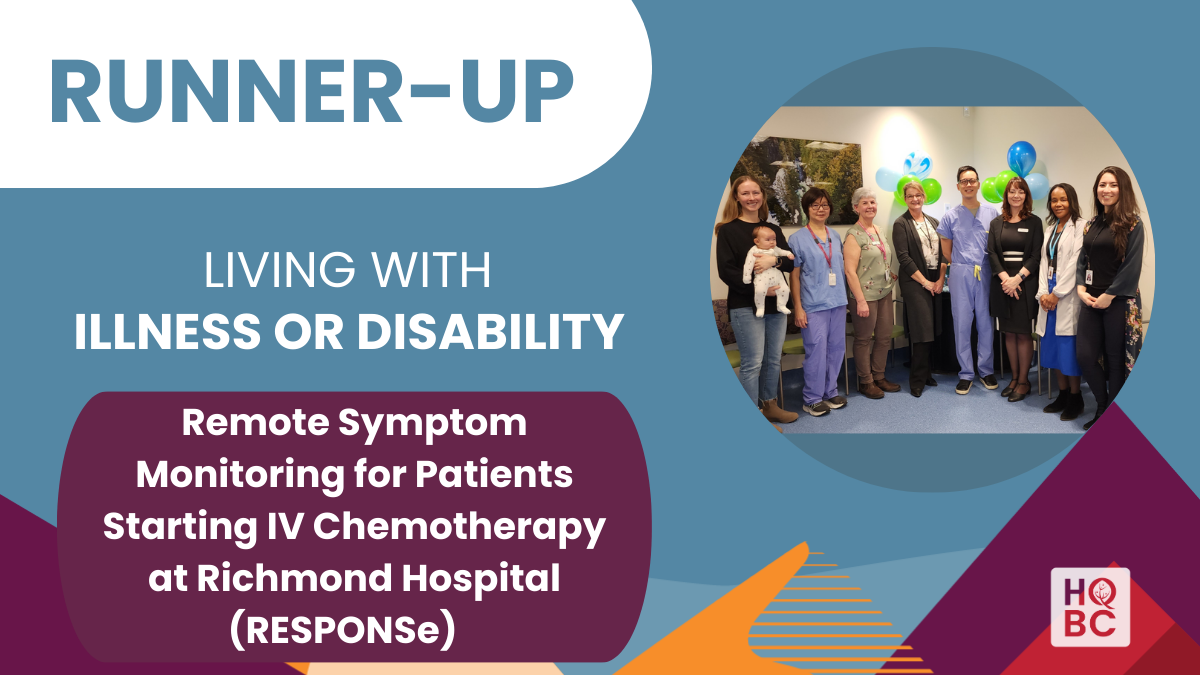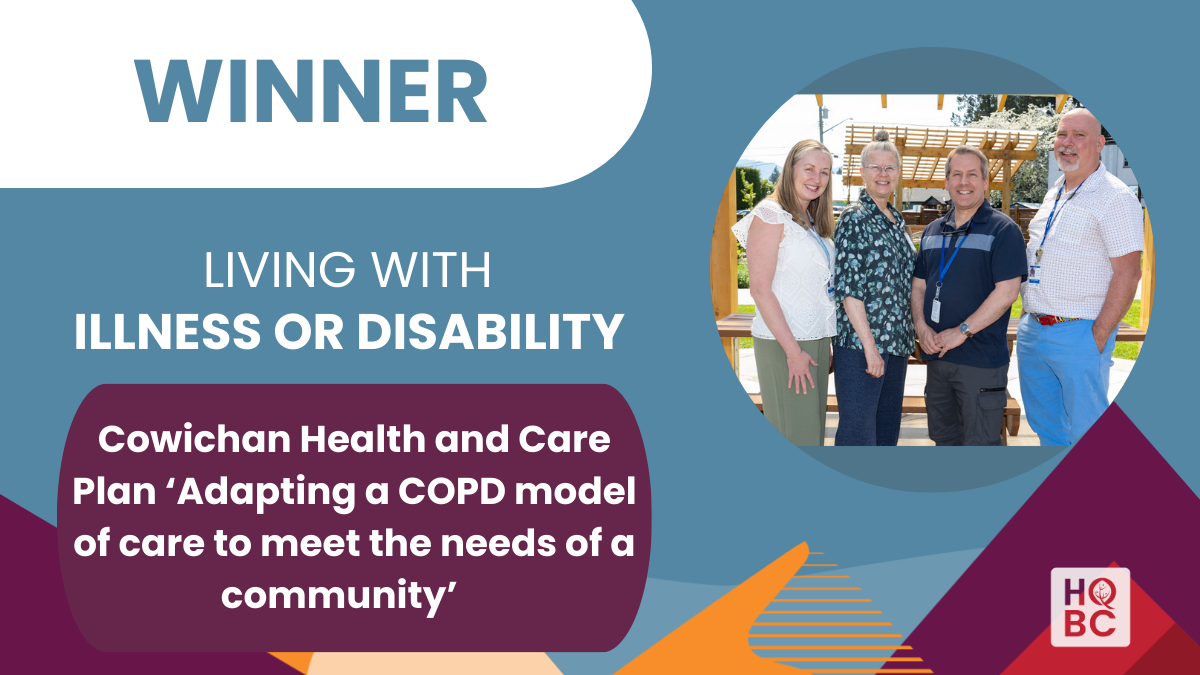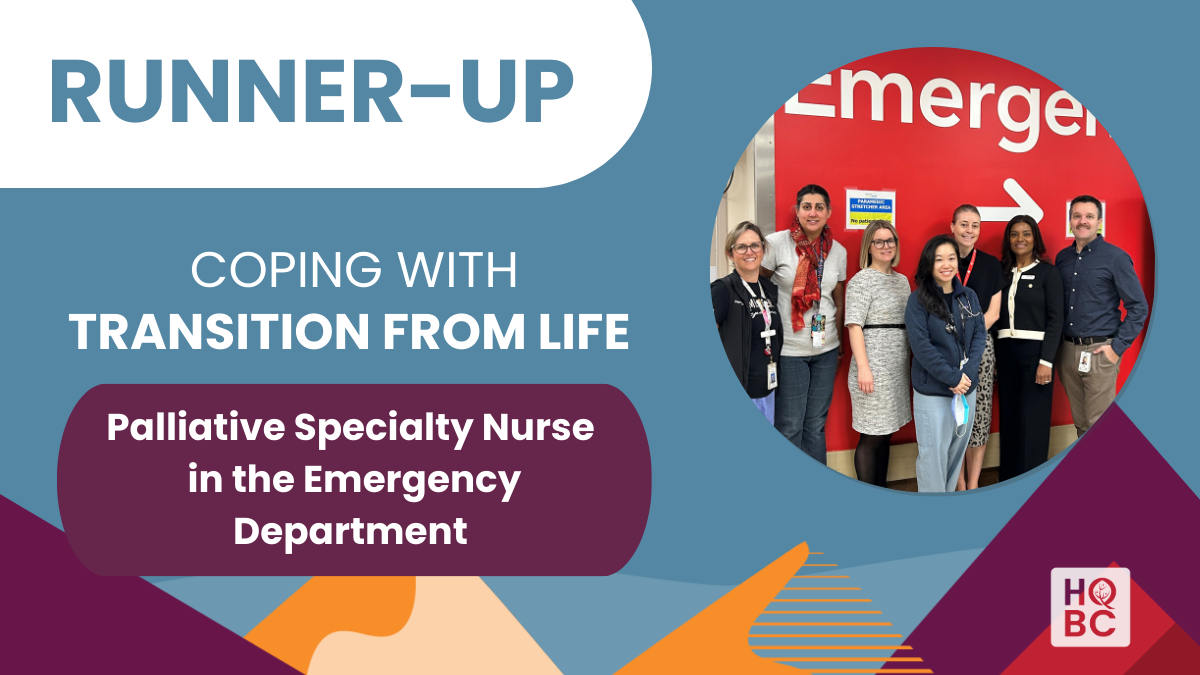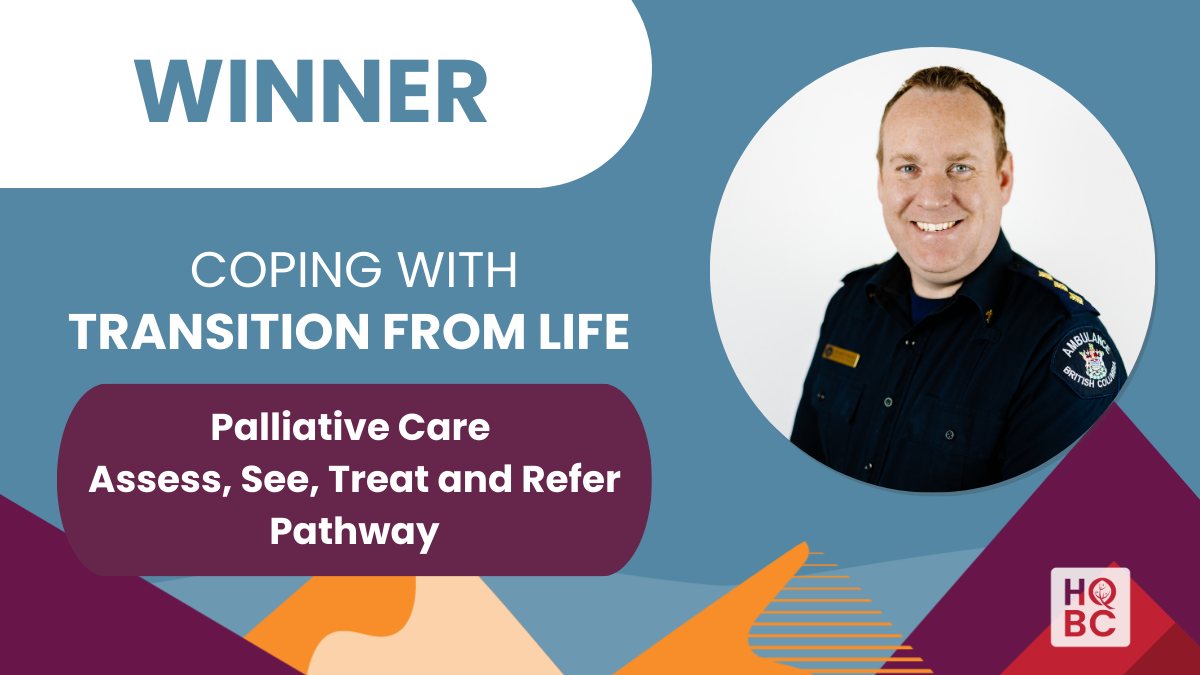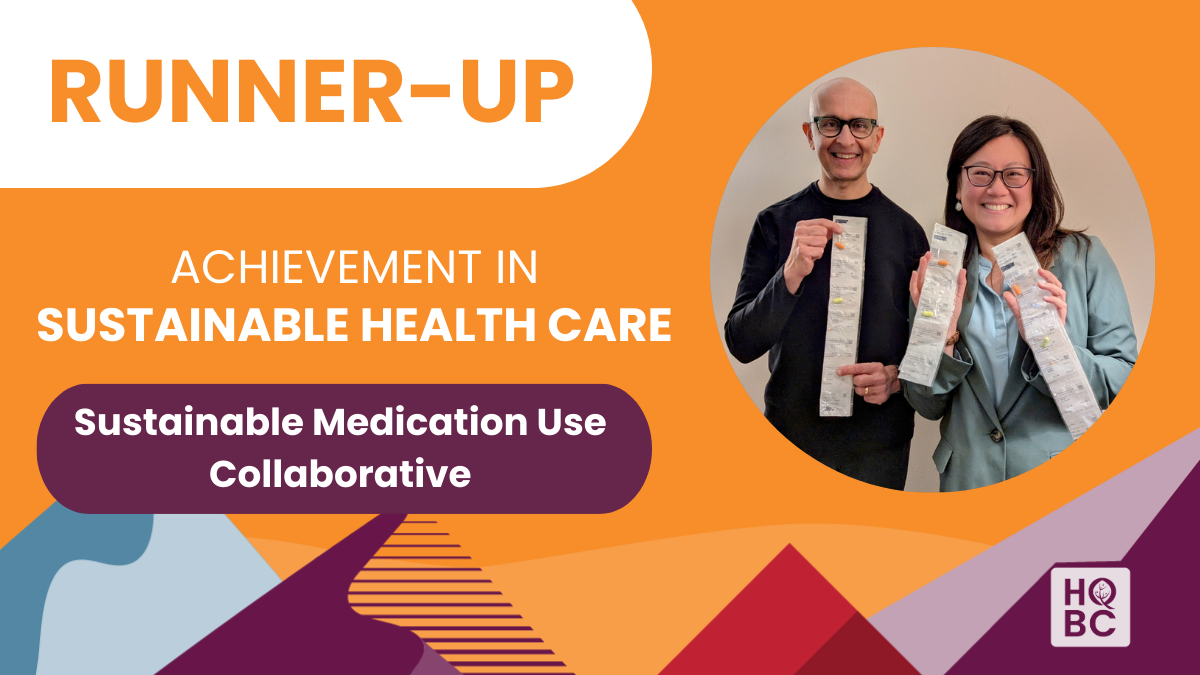We are honoured to celebrate the winners and runners-up of the 2025 BC Quality Awards, recognizing their remarkable contributions to improving the quality of health care in British Columbia.
The 2025 awards saw the introduction of a new category: the Achievement in Sustainable Health Care award. This award recognized teams who showed leadership in clinical practices that promote environmental sustainability, mitigate against the impacts of climate change, and result in measurable improvement the quality of care. You will find this new award in the Transformative Leadership category, alongside the award for Leadership in Co-Designing Health Quality with Communities.
Many impactful projects were nominated for their contributions to improving BC’s health care system, and our judges’ panel had the challenge of selecting 20 winners and runners-up from an outstanding pool of nominations. These programs and initiatives are excellent examples of the dedication, leadership and passion that drive health care improvement. Their achievements have touched thousands of patients and families across our province.
Optimizing the Early Years
-

EMSP – Early Motor Screening Program
Provincial Health Services Authority
Provincial Laboratory Medicine Services and Perinatal Services BC worked together to implement new newborn screening protocols for three additional treatable conditions under accelerated timelines and an expanded testing program. Since this new protocol was introduced, 16 infants have been identified and received a clinical intervention because of these additional screening tests. -

BC Women’s Hospital Allergy Clinic Team
BC Women’s Hospital & Health Centre
The BC Women’s Hospital Allergy Clinic Team is Canada’s first dedicated centre for testing and removing penicillin allergies in pregnant individuals, significantly improving outcomes for both patients and newborns. Since its inception, the clinic has helped 800 patients, reducing unnecessary medical interventions and complications related to postpartum infections and caesarean wounds. The initiative’s success has established penicillin allergy delabelling as a standard of care, leading to cost savings for the system and inspiring similar programs across Canada.
Strengthening Health & Wellness
-

Cognitive Behavioural Therapy Skills Training Spread Initiative
Shared Care Committee, JCC and UBC CPD
The Shared Care Committee has partnered with UBC Continuing Professional Development and Mind Space to deliver a Cognitive Behavioural Therapy (CBT) Skills program for both physicians and primary care patients experiencing mild to moderate anxiety and depression. The program offers group sessions, either in-person or virtually, focusing on CBT techniques, mindfulness, and emotional regulation to support mental well-being. It provides accessible, evidence-based support for both patients and physicians, helping to prevent mental health issues from escalating and creating a supportive community for practitioners. -

Inter- and Intra-Health Authority Relocation Working Group
Health Emergency Management BC
This pioneering initiative has helped strengthen health services during climate-related emergencies, particularly in the context of evacuations from long-term care, assisted living and independent living facilities. Developed through collaboration between multiple health organizations, the toolkit prioritizes patient-centred, culturally-safe care. Its successful implementation during the 2023 wildfire season demonstrated its profound impact on maintaining continuity of care and minimizing trauma, setting a new standard for emergency management in health care.
Returning to Health & Wellness
-

The Independence Model (TIM)
Providence Health Care
The Independence Model (TIM) at St. Paul’s Hospital focuses on preventing functional decline in patients during acute care by preserving key abilities like walking, eating and personal care. Rehabilitation Assistants play a central role, providing tailored interventions to maintain patients’ physical and cognitive functions, allowing quicker recoveries and safer hospital stays. TIM enhances patient outcomes by fostering collaboration among health care teams, engaging patients and families, and reducing unnecessary referrals, while also addressing staffing challenges in rehabilitation services. -

Bridging Care Program
Island Health
The Bridging Care Program offers an alternative to hospitalization for individuals with acute psychiatric challenges in Greater Victoria, providing intensive day programs with personalized care. In its first year, 135 clients successfully completed the program, showing improvements in mental health and wellness, and reducing inpatient admissions. Due to its success, plans are underway to expand the program with a virtual model to reach a broader population.
Living with Illness or Disability
-

Remote Symptom Monitoring for Patients Starting IV Chemotherapy at Richmond Hospital (RESPONSe)
Vancouver Coastal Health
This program has transformed symptom management for cancer patients through innovative remote monitoring and proactive care. Through integrating digital symptom monitoring and a dedicated Symptom Management Nurse, the program has enabled timely interventions based on patient-reported outcomes. Since launching in January 2024, the program has significantly reduced emergency visits, increased patient satisfaction, and improved communication between patients and clinicians. -

Cowichan Health and Care Plan ‘Adapting a COPD model of care to meet the needs of a community’
Island Health
The Cowichan Valley has one of the highest rates of chronic obstructive pulmonary disease (COPD) in BC. One of the first initiatives the Cowichan Health and Care Plan launched was a program to better support patients and health care providers to manage COPD and reduce hospitalizations in the region. Since its implementation, the COPD outreach program has empowered more than 750 clients to manage their condition confidently, resulting in fewer hospital visits, improved self-management, and enhanced quality of life for participants.
Coping with Transition from Life
-

Palliative Specialty Nurse in the Emergency Department
Vancouver Coastal Health
As the population ages and becomes increasingly medically complex, many patients in their last months of life are presenting to emergency departments (ED), often in the final stages of serious illness. A QI project at Vancouver General Hospital (VGH) embedded a Palliative Clinical Nurse Specialist (CNS) in the ED to proactively identify patients with palliative care needs, facilitating goals-of-care conversations and connecting patients to appropriate supports. The CNS has helped prevent 22 acute admissions, saving an estimated $680,000, while improving patient-centred care and reducing ED stays. -

Palliative Care Assess, See, Treat and Refer Pathway
BC Emergency Health Services
This initiative focuses on symptom management, psychosocial support and collaboration with community care teams to ensure comfort and quality of life for palliative patients. The pathway was yielded through the Paramedics & Palliative Care Project, developed by BC Emergency Health Services, and integrates a patient-centred approach to end-of-life care that prioritizes treatment at home over hospital transport. By formalizing processes and equipping paramedics with new tools, the pathway has improved care delivery, respected patient wishes, and reduced strain on emergency services.
Leadership in Co-Designing Health Quality with Communities
Achievement in Sustainable Health Care
-

Sustainable Medication Use Collaborative
Fraser Health
Gigi Wong, Aaron Tejani and the Fraser Health Medication Use Evaluation team are focused on reducing pharmaceutical waste in inpatient hospitals by reusing returned medications instead of incinerating them. Their pilot project, which tested a new model for sorting unused medications, showed significant financial savings and reduced waste. This initiative aligns with sustainability goals by cutting down on environmental impacts and emissions and has the potential to be expanded across multiple health authorities in the region. -

The Critical Air Project
Island Health
Climate change poses a significant challenge to health care, with inhalers contributing notably to greenhouse gas emissions. Through the Critical Air Project, Valeria Stoynova and Celia Culley have implemented innovative policy, operational and educational strategies to reduce the carbon footprint of inhaler use while maintaining high-quality patient care. Their work serves as a model for sustainable health care practices, inspiring efforts nationwide to address climate impacts in health care systems.
The Doug Cochrane Leadership in Quality Award
-

Joanna Harrison
Interior Health
Joanna Harrison is a Certified Health Executive with 20 years of leadership experience in health system strategic planning and clinical informatics. As Executive Director of Clinical Informatics and Digital Health at Interior Health, she leads initiatives to improve person-centred care through technology and data-driven systems. Joanna’s transformative leadership, especially during the pandemic, has contributed significantly to seniors’ care services, mental health support and reducing social isolation, with a focus on innovation, technology and improving care quality in British Columbia. -

Linda Dempster
Ministry of Health
Linda Dempster has demonstrated compassionate leadership in BC’s health care system for over 38 years, championing initiatives that improve quality and patient-centred care. In recognition of her contributions, she has been awarded the Doug Cochrane Leadership in Quality Award, which honours leaders who reflect the passion Doug had for compassion-led health care. Much like Doug, Linda’s passion and unwavering commitment for quality of care and a remarkable patient experience are hallmarks of the legacies she will leave.
Everyday Champion
-

Elaine Chu
Fraser Health Authority
Elaine Chu, Director of Food Service Transformation at Fraser Health, is revolutionizing hospital food services with innovative, sustainable initiatives. From reducing the carbon footprint of meals to enhancing patient satisfaction, Elaine’s projects, such as plant-based menu options and community food fairs, exemplify her commitment to health and environmental stewardship. Through collaborations like the “Food Strategy for People and Planet,” she’s setting a new standard for sustainable health care practices. -

Deborah Roberts
BC Emergency Health Services
Deb Roberts, a Licensed Primary Care Paramedic, has dedicated nearly 25 years to BC Emergency Health Services (BCEHS). In 2013, she founded the High School EMR Program, a dual-credit course for Grade 11 and 12 students, providing Emergency Medical Responder certification and inspiring health care careers. Starting in Port Alberni, the program has expanded province-wide, earning Deb recognition for her leadership and contributions to youth development and BCEHS recruitment.
Leadership in Advancing the Patient Voice
-

Kristi Coldwell
Patient Voice
Kristi Coldwell is a passionate advocate for patient engagement, ensuring that the voices of patients with lived experiences are integrated into health care improvements. She leads initiatives in Patient-Oriented Research, supports training programs for Patient Family Partners, and chairs advisory groups to embed patient engagement in research and health care governance. Through her own heart transplant experience, Kristi inspires others and has made a significant impact in shaping patient-centred health care across BC. -

Greg Hemminger
Patient Voice
Greg Hemminger is a dedicated individual whose impact on the substance use care system can be felt across the province. As the Lower Mainland regional coordinator for the Tailgate Toolkit Program, Greg has expanded harm reduction outreach to tradespeople by engaging directly with workers at construction sites, boxing gyms and treatment centers providing vital resources and education. Known for his humility, positivity and dedication to systemic improvement, Greg’s efforts have continued to drive meaningful advancements in health care.


